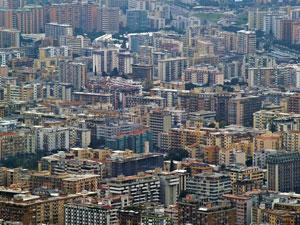Young Sicilians say goodbye to mafia bribes
Palermo (Image by Flickr user Jules Stoop (cc:by-ns-sa))
This story was originally reported on PRI’s The World. For more, listen to the audio above.
About six years ago, residents of Palermo, Italy, awoke to a guerilla protest against the infamous Sicilian Mafia. Stickers were strewn about the city saying, “A public that pays pizzo is a public without dignity,” referring to the bribe or “pizzo” that businesses pay to the mafia for “protection.”
The group behind the stickers is called “Addiopizzo” or “Goodbye Pizzo,” and its members are mostly volunteers under the age of 35. The group has persuaded hundreds of business owners to not pay the extortion tax. It also hosts rallies and visits schools with its anti-Mafia message.
The group has made a difference, 81-year-old fabric store owner Pina Maisano Grassi told PRI’s The World, “because the idea came from the young people who understood how important it is to revolt against the Mafia and its bullying.” Grassi, whose husband was murdered by the Mafia in 1990, has played a key advisory role to the group.
Some of the inspiration for Addiopizzo comes from their experience with the Mafia battles of the 1990s. In 1992, two anti-Mafia magistrates were blown up in the space of a month. Volunteer Dario Riccobono, who was 13 at the time, told The World, “I saw with my own eyes the horrors of the Mafia. I saw the highway blown to bits. It seemed like a war zone. From that moment onward, I said to myself that if I didn’t do something, it would be like I was an accomplice of the Mafia.”
Francesco Galante of the anti-Mafia group Libera Terra Mediterraneo was a 10 year old playing at the beach when he heard about the first car explosion. He said, “For us, the massacres of ’92 are comparable to September 11th. Everyone remembers where we were, what we were doing when we heard the news.”
Libera Terra, meaning “Free Land,” sells wines, pasta, wheat, melons and lentils from five co-ops that boast “From lands freed from the Mafia” on its packages. Some of the cooperatives are based on land confiscated from notorious mafia leaders. The products are sold nationwide, Global Post reports, including in three dedicated shops in Rome, Naples, and Palermo.
“In the early days, our customers would buy a pack of pasta knowing that perhaps it wasn’t top quality, but they still wanted to help,” said Francesco Galante, spokesman for the cooperative, told Global Post. “Now we have reached a stage where all the Libera Terra cooperatives market excellent products: Our aim is to secure a faithful clientele which will stick to our products because of their quality.”
The Sicilian Mafia has undoubtedly lost ground in recent years, but fighting against the mafia is still dangerous work. When asked if he is ever scared, Dario Riccobono responded:
Um, look, we don’t have time for fear. We have so many things to do and don’t have the time. No, really, I am fearful. I’m fearful that Sicily will always remain the way it is now.
PRI’s “The World” is a one-hour, weekday radio news magazine offering a mix of news, features, interviews, and music from around the globe. “The World” is a co-production of the BBC World Service, PRI and WGBH Boston. More “The World.”
